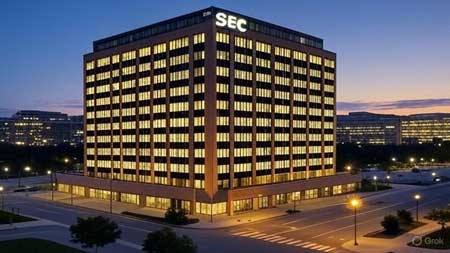Crypto Task Force Remarks of SEC Chair Atkins
June 9, 2025
SEC Chairman Paul S. Atkins, in a speech titled “DeFi and the American Spirit,” linked DeFi to values like economic liberty and innovation, praising blockchains for enabling peer-to-peer crypto ownership. He criticized past discouragement of participation, welcomed recent clarifications on staking not being securities, and pushed for formal regulations. Atkins supported self-custody, cautioned against stifling innovation, and proposed an “innovation exemption” to make America the “crypto capital,” directing staff to explore rule adjustments.

Analysis of Crypto Task Force Remarks of SEC Chair Atkins
Paul S. Atkins, Chairman of the SEC, delivered a speech at the Crypto Task Force Roundtable on Decentralized Finance, titled “DeFi and the American Spirit,” emphasizing the alignment of DeFi with American values such as economic liberty, private property rights, and innovation. He described blockchains as shared databases enabling ownership of crypto assets without intermediaries, using economic mechanisms like demand-based fees to encourage network participants to validate and maintain the database. This peer-to-peer model, he argued, reflects free-market principles, contrasting with traditional intermediated systems.
Atkins critiqued the previous administration’s approach, which discouraged American participation in these systems through lawsuits, speeches, and threatened regulatory actions, suggesting participants and staking-as-a-service providers might be engaged in securities transactions.
However, he welcomed the Division of Corporation Finance’s recent clarification that voluntary participation in proof-of-work or proof-of-stake networks as miners, validators, or staking-as-a-service providers is not within the scope of federal securities laws. Despite this, he noted this clarification lacks the force of law, urging the SEC to adopt formal regulations based on congressional authority to ensure legal certainty.
A significant focus was on self-custody, which Atkins described as a foundational American value extending to digital assets. He opposed the prior administration’s regulatory actions against developers of self-custodial digital wallets, asserting that engineers should not be liable under federal securities laws solely for publishing software code. He cited a court decision comparing this to holding a self-driving car manufacturer liable for a driver’s wrongdoing, such as committing a traffic violation or robbing a bank, arguing it would be irrational to sue the car company rather than the individual.
Atkins highlighted the potential of blockchain-enabled self-executing software, which operates without administration by any operator, enabling private, peer-to-peer transactions. He cautioned against allowing century-old regulatory frameworks to stifle this innovation, noting that on-chain systems have proven resilient during recent crises, unlike centralized platforms that wavered and failed. He referenced the ability of these systems to continue operating as designed pursuant to open-source code, underscoring their reliability.
Recognizing that current securities rules are premised on regulating issuers and intermediaries like broker-dealers and exchanges, Atkins acknowledged these frameworks may not fully contemplate self-executing software displacing traditional intermediaries. He has directed the SEC staff to explore whether further guidance or rulemaking is needed to enable registrants to transact with these systems in compliance with applicable law. Additionally, he is excited about the use of on-chain software by issuers and intermediaries to eliminate economic frictions, increase capital efficiency, enable new financial products, and enhance liquidity. To accommodate this, he has asked the staff to consider amendments to the SEC’s rules and regulations, ensuring they are suited for on-chain financial systems.
Finally, to fulfill President Trump’s vision of making America the “crypto capital of the planet,” Atkins has directed the staff to consider a conditional exemptive relief framework, or “innovation exemption,” allowing registrants and non-registrants to bring on-chain products and services to market expeditiously, provided they comply with specific conditions to ensure regulatory oversight. This framework would encourage developers, entrepreneurs, and firms willing to comply with certain conditions to innovate with on-chain technologies in the United States, reflecting a proactive approach to fostering innovation.
Conclusion
As of June 10, 2025, the SEC is actively engaging with the crypto industry through its Crypto Task Force, which has been hosting roundtables, including the recent DeFi discussion. Chairman Atkins’ speech reflects a commitment to fostering innovation in the crypto industry while ensuring regulatory clarity, with the SEC working on an ‘innovation exemption’ for on-chain products and services to encourage development within a compliant framework. This aligns with Atkins’ emphasis on distinguishing securities from non-securities.
Legislatively, the CLARITY Act, introduced on May 29, 2025, aims to overhaul digital asset regulation, expanding the Commodity Futures Trading Commission’s (CFTC) authority over digital commodity markets and defining terms like “digital commodities” and “investment contract assets.” It includes exemptions for capital raises up to $75 million over 12 months and requires issuer disclosures until blockchains are deemed “mature,” excluding DeFi from certain market structure rules . These developments suggest a coordinated effort to clarify regulations, balancing innovation with investor protection, though debates continue around developer liability and regulatory scope.
The post “Crypto Task Force Remarks of SEC Chair Atkins” first appeared on DigitalAsset.Law on June 9, 2025.